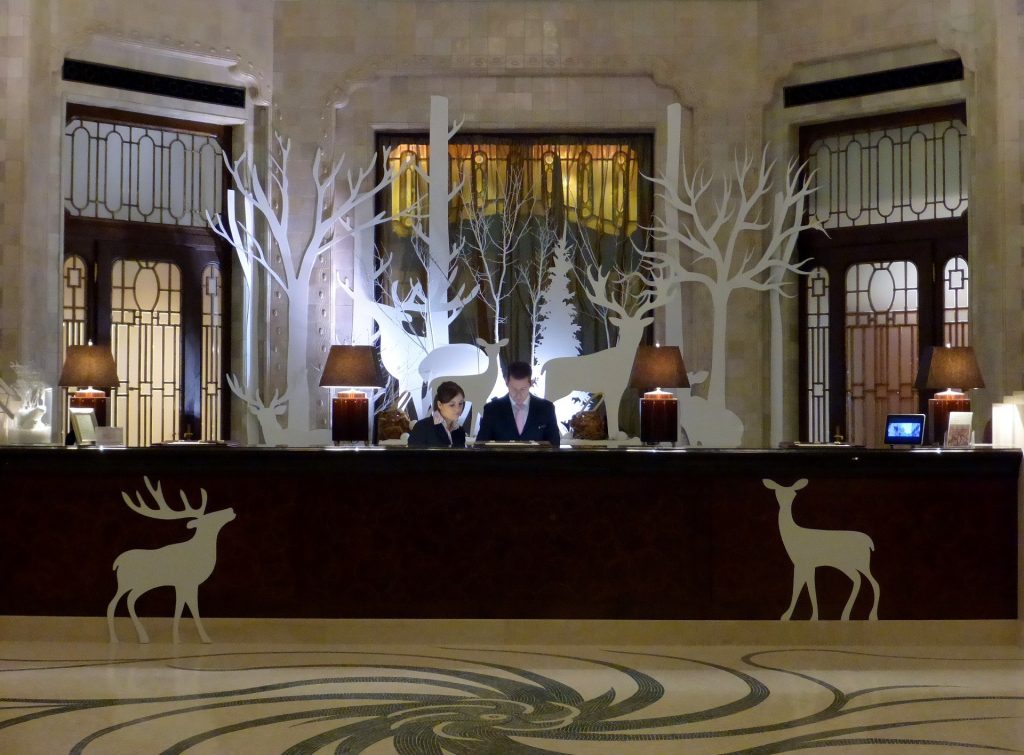Today most hotel front desk is very much similar as it was two decades ago.
The first line of client service in the hospitality industry is hotel front desk agents.
They welcome guests, allocate room, arrange meeting halls, accept payments, distribute room keys.
Overall, ensure that the guest has everything required for a comfortable stay.
One fixture remains a puzzling constant as technology continues to change the hotel industry: the front desk.
Move into the average hotel of 50 to 200 rooms, and normally you can find a high counter where a guest makes a deposit and picks up a room key.
Over the years, hotel record-keeping shifts from paper-based systems to sophisticated computerised technology.
And it continues to help hotels raise profitability while delivering a seamless guest experience.

Future of hotel front desk
Advance technologies
Technology is increasingly changing, and the future will be a faceless front desk for many establishments.
Nowadays, many hotel chains are already using automated check-in technology.
The formality of arriving at the front desk can be reduced by features such as smartphone room entry.
Guests that use this app, reserve their room online.
They receive a text message with their room number connected to the guest’s preferred member card on the day of check-in.
By placing their smartphone near the door lock or by punching in a code, they can go straight to their hotel room and access their room.
Facial recognition technology will be introduced by some hotels.
When the guest checks in at the front desk, his picture is recorded and assigned to a room number.
No key is required for the guest to access his room.
CHECK-IN
Computerize front desk technology allows the agent to perform check-in tasks.
Ranging from availability and reservations of rooms to inventory, pricing and capture of guest data.
At checkout, the billing of the guest is incorporated with phone accounting, entertainment expenses in the room and sales at the point of sale.
In order to promote productivity and minimise wait times, front desk technology provides agents with real-time information.
In-Room Technology
Today’s traveller carries numerous electronic devices, and reliable wireless internet connectivity ranks at the top of the list for customer needs.
Some luxury hotels provide iPads or smartphones to customers for use during their stay.
Guests can use the hotel’s web application to access room service options.
Its uses via an e-dining internet site or uses an interactive service that finds nearby restaurants, transportation or shopping.
Effective tools
Hotel front desk technology gives hotel owners the tools to most effectively serve guests and increase revenue.
Benefits include improving customer service, efficient internal operations and control over financial data.
There are hundreds of systems tailor to fit the size of the establishment.
Smaller hotels, motels or bed and breakfasts may opt for basic check-in and checkout technology.
Larger chains may use this technology for the complete guest room and rate management.
Further, it integrates online reservation booking, personnel and inventory management.
PROS AND CONS
In order to boost their operation, more and more hotels are seeking to experiment with their check-in procedures.
Using the kiosk instead of usually coming up to the front desk and getting the key from the receptionist is one of the ways for the arriving traveller.
If this kind of hotel upgrade catches on, we can soon be able to live (or travel) in the world.
Where when we have an emergency request or when a housekeeper knocks on our door, the only time we touch a hotel staff.
AUTOMATED VERSUS TRADITIONAL SYSTEMS
The upside of the automated service in the Hotels
Hotel kiosks are something that speeds up the whole operation.
Entering a code and scanning your passport is the only thing you have to do to get your key.
After that, the device continues with the payment, delivers the number of keys selected, and you can go directly to the room.
The procedure takes up to 3-4 minutes and more people can check-in at the same time with kiosks.
Thus, the waiting period decreases significantly.
The kiosk can configure from the hotelier’s side to ensure that they provide all the critical information to the guests.
When checking in, the computer will display some additional options available to a traveller at this particular hotel.
For instance, upgrading the room, booking a tour or reserving a restaurant table.
As well as basic details and instructions for the use of the guests.
The only important thing is to be responsible for testing and maintaining the system fit for the customers at all times.
Traditional check-in and service with the help from the receptionist
The receptionist will see and speak to the client, give them some personal advice or recommendation or simply adjust to the guest.
In this way, the hotel is seen as one with a skillful, knowledgeable staff full of experience who can answer every question of guests.
As much as we understand that the receptionist is doing his or her best, we tend to get a little tired after waiting 20 minutes for our key.
We also need to understand how the hotel deals with the concerns that the guests may have.
You are confident they care and are there to assist you in some way when the problem arises and you can go to the person responsible for the service.
After making your inquiry or complaint, the system will show you immediately that your issue is ressolve now or you have to wait.
An staff will speak to you or check what you need and how they can assist you personally.
Conclusion
As you can see, every choice has upsides and downsides.
Self-check-in kiosks can make the process itself simpler as well as communication inside the property.
What one will be better? What is the most desirable future vision?
I believe a mixture of services of man and machine is require.
Please share views in the comment box.
If you want to learn about the functionality of QloApps then you can visit this link: QLO Reservation System – Free Open-Source Hotel Booking & Reservation System
In case of any query, issue or requirement please feel free to raise it on QloApps Forum

Be the first to comment.